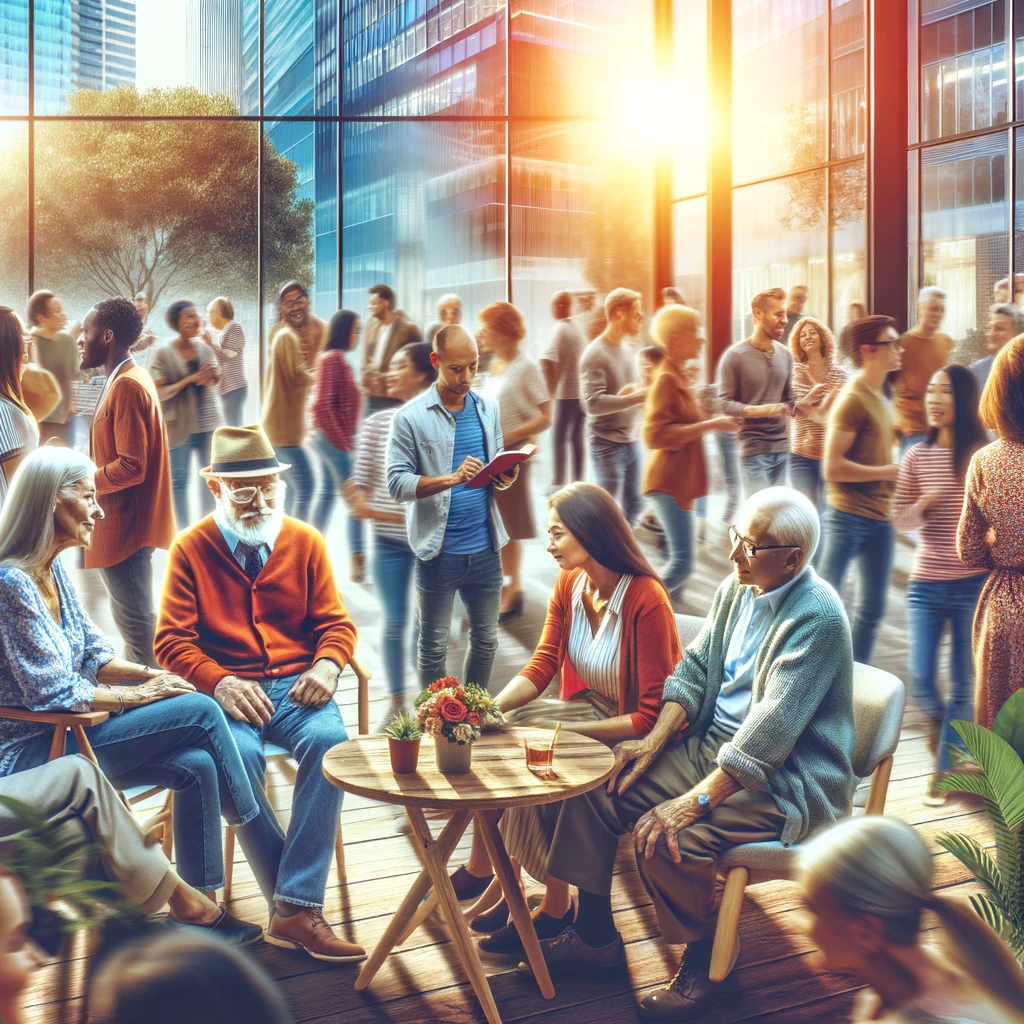Evolving Social Norms: Navigating the New Terrain for Seniors
The Impact of Changing Social Norms on Seniors
In today's rapidly evolving society, seniors are experiencing a shift in social norms that is reshaping their lives in profound ways. The impact of these changes can be seen across various aspects of senior life, from community engagement to healthcare access.
Here are some key ways in which changing social norms are affecting seniors:
- Increased focus on inclusivity and diversity, leading to more opportunities for seniors to participate in social activities.
- Greater awareness and acceptance of mental health issues among seniors, encouraging open discussions and seeking support.
- Shift towards age-friendly environments that cater to the needs and preferences of older individuals.
- Emphasis on intergenerational connections, fostering meaningful relationships between seniors and younger generations.
These changes highlight the importance of adapting to evolving social norms to ensure a fulfilling and enriching life for seniors.
The Influence of Technology on Social Norms for Older Adults
 Technology has become an integral part of modern society, influencing various aspects of daily life, including social norms for older adults. The adoption and utilization of technology among seniors have led to significant changes in how they interact with others and engage with the world around them.
Technology has become an integral part of modern society, influencing various aspects of daily life, including social norms for older adults. The adoption and utilization of technology among seniors have led to significant changes in how they interact with others and engage with the world around them.
Here are some ways in which technology shapes social norms for older adults:
- Communication: Technology enables older adults to stay connected with loved ones through video calls, messaging apps, and social media platforms, breaking down barriers of distance and enhancing social relationships.
- Information Access: Online resources provide seniors with access to a wealth of information on health, hobbies, news, and more, empowering them to make informed decisions and stay informed about current events.
- Community Engagement: Virtual communities and online forums offer older adults opportunities to connect with like-minded individuals, share experiences, and participate in discussions on various topics.
- Healthcare: Telemedicine services allow seniors to consult healthcare providers remotely, improving access to medical care and promoting proactive health management.
By embracing technology, older adults can navigate changing social norms more effectively and enhance their overall quality of life.
Evolving Family Structures on Social Norms for Seniors
As family dynamics continue to evolve in modern society, the social norms surrounding seniors are also undergoing significant changes. The structure and composition of families play a crucial role in shaping the experiences and expectations of older adults within their communities.
Here are some ways in which evolving family structures influence social norms for seniors:
- Multigenerational Living: The resurgence of multigenerational households can provide seniors with increased support, companionship, and caregiving assistance, challenging traditional notions of independence and autonomy.
- Delayed Parenthood: Delayed childbearing among younger generations may result in seniors becoming grandparents at later stages in life, impacting their roles within the family unit and altering intergenerational relationships.
- Divorce Rates: Higher divorce rates and remarriages can lead to complex family dynamics for seniors, affecting inheritance rights, caregiving responsibilities, and social interactions within their extended families.
- Solo Living: The rise in solo living arrangements among seniors may reflect changing preferences for independence and autonomy, influencing how they engage with their communities and seek social connections.
By recognizing and adapting to these shifts in family structures, seniors can navigate changing social norms with resilience and adaptability.
The Influence of Cultural Shifts on Aging Perceptions
Cultural shifts have a profound impact on how aging is perceived and experienced within society. As social norms evolve, so do attitudes towards seniors and the aging process, reflecting broader changes in cultural values and beliefs.
Here are some ways in which cultural shifts affect the perception of aging in society:
- Representation: Increased representation of seniors in media, advertising, and popular culture can challenge stereotypes and promote more diverse and positive portrayals of aging individuals.
- diversity: Embracing cultural diversity and recognizing the unique experiences of seniors from different backgrounds can foster greater understanding and appreciation for the richness of aging experiences.
- Interconnectedness: Cultural shifts towards interconnectedness and community engagement can encourage seniors to participate in social activities, pursue lifelong learning, and maintain active lifestyles.
- Resilience: Cultivating a culture of resilience and empowerment among seniors can help combat ageism, promote self-confidence, and inspire individuals to embrace new opportunities as they age.
By acknowledging the influence of cultural shifts on perceptions of aging, society can create more inclusive and supportive environments for seniors to thrive.
Gender Roles and Social Norms for Seniors
Gender roles play a significant role in shaping the social norms and experiences of seniors within society. The expectations and stereotypes associated with gender can influence how older adults are perceived, treated, and valued as they age.
Here are some ways in which gender roles impact the social norms experienced by seniors:
- Caregiving: Traditional gender roles may influence expectations around caregiving responsibilities, with women often shouldering a disproportionate burden of care for senior family members.
- Financial Security: Gender disparities in income and retirement savings can affect the financial well-being of seniors, particularly women, leading to increased vulnerability and reliance on support systems.
- Healthcare Access: Gender biases in healthcare settings can impact the quality of care received by seniors, with certain conditions or symptoms potentially overlooked or undertreated based on gender stereotypes.
- Social Engagement: Gender norms may influence the types of social activities and support networks available to seniors, shaping their opportunities for connection, participation, and inclusion within their communities.
By recognizing and challenging traditional gender roles, society can create more equitable and supportive environments for seniors to navigate changing social norms with dignity and respect.
The Evolution of Independence for Seniors
 As social norms surrounding seniors continue to shift, the concept of independence for older adults is also undergoing a transformation. Independence, once defined solely in terms of physical autonomy, is now being redefined to encompass a broader spectrum of personal agency and empowerment.
As social norms surrounding seniors continue to shift, the concept of independence for older adults is also undergoing a transformation. Independence, once defined solely in terms of physical autonomy, is now being redefined to encompass a broader spectrum of personal agency and empowerment.
Here are some ways in which the concept of independence is evolving with changing social norms for seniors:
- Autonomy: While physical independence remains important, there is a growing recognition of the need for emotional and social autonomy among seniors, allowing them to make choices that align with their values and preferences.
- Interdependence: Embracing interdependence and seeking support from others is seen as a sign of strength rather than weakness, encouraging seniors to build networks of care and connection within their communities.
- Empowerment: Empowering older adults to advocate for their needs, access resources, and participate in decision-making processes promotes a sense of agency and self-determination, enhancing their overall well-being.
- Lifelong Learning: Emphasizing lifelong learning and personal growth enables seniors to continue exploring new interests, acquiring new skills, and engaging with the world around them, fostering a sense of purpose and fulfillment.
By embracing this evolving definition of independence, seniors can lead more fulfilling lives and contribute meaningfully to society while challenging outdated stereotypes and limitations.
Urbanization's Impact on Social Interactions and Norms for Seniors
The process of urbanization has profound effects on the social interactions and norms experienced by older individuals within urban environments. As cities grow and evolve, so do the dynamics of community engagement, support systems, and opportunities for seniors to participate in social activities.
Here are some key effects of urbanization on the social interactions and norms of older individuals:
- Community Accessibility: Urban areas often offer a wide range of amenities, services, and cultural activities that can enhance the quality of life for seniors, providing opportunities for engagement and connection within their neighborhoods.
- Social Isolation: Despite the bustling nature of cities, seniors in urban settings may experience feelings of isolation and loneliness due to factors such as limited mobility, lack of social support networks, and changing neighborhood demographics.
- Age-Friendly Initiatives: Urban centers are increasingly implementing age-friendly initiatives to create inclusive environments that cater to the needs of older adults, promoting accessibility, safety, and opportunities for active participation in community life.
- Intergenerational Relationships: Urban settings facilitate diverse interactions between generations, offering seniors opportunities to engage with younger individuals through shared spaces, events, and programs that foster mutual understanding and connection.
By understanding the complex interplay between urbanization and social norms, society can create more supportive and inclusive environments for older individuals to thrive in urban settings.
Economic Factors and Changing Social Norms for Seniors
Economic factors play a significant role in shaping the social norms experienced by seniors as financial considerations can influence various aspects of their lives, from healthcare access to lifestyle choices. The intersection of economics and aging can lead to shifts in societal attitudes and expectations towards older adults.
Here are some ways in which economic factors contribute to the changing social norms for seniors:
- Retirement Planning: Economic stability and retirement savings impact seniors' decisions around when and how they retire, influencing their financial independence and overall well-being in later life.
- Healthcare Access: Affordability of healthcare services and insurance coverage can determine the quality of care received by seniors, affecting their health outcomes and ability to maintain a high quality of life.
- Housing Options: Economic constraints may limit housing choices for older adults, leading to considerations around aging in place, downsizing, or seeking alternative living arrangements that align with their financial resources.
- Social Participation: Financial resources can impact seniors' ability to engage in social activities, travel, or pursue hobbies, shaping their opportunities for connection, leisure, and personal fulfillment.
By recognizing the influence of economic factors on social norms for seniors, society can work towards creating more equitable and supportive environments that address the diverse needs of aging populations.
Healthcare Policy's Influence on Societal Attitudes Towards Aging Populations
Healthcare policy plays a crucial role in shaping societal attitudes towards aging populations by influencing access to care, quality of services, and support systems for older adults. The policies and programs implemented by governments can have a significant impact on how aging is perceived and experienced within society.
Here are some ways in which healthcare policy shapes societal attitudes towards aging populations:
- Access to Care: Healthcare policies that prioritize affordable and accessible services for older adults can promote positive attitudes towards aging by ensuring that individuals receive the care they need to maintain their health and well-being.
- Preventive Services: Policies that emphasize preventive care and wellness programs for seniors can shift societal attitudes towards aging from a focus on illness and decline to one of proactive health management and vitality.
- Long-Term Care: Policies addressing long-term care options, including home care, assisted living, and nursing facilities, can influence perceptions of aging by providing support for individuals as they age and require additional assistance.
- Quality of Life: Healthcare policies that prioritize quality of life measures, palliative care, and end-of-life services for seniors can foster a more compassionate and supportive approach to aging, emphasizing dignity, comfort, and respect for individuals as they grow older.
By understanding the impact of healthcare policy on societal attitudes towards aging populations, policymakers and communities can work together to create environments that promote healthy aging, well-being, and inclusivity for older adults.
Intergenerational Relationships and Evolving Social Norms for Seniors
Intergenerational relationships play a vital role in influencing and reflecting the evolving social norms experienced by seniors in today's society. The interactions and connections between different age groups can shape attitudes, values, and behaviors towards aging individuals, fostering understanding and collaboration across generations.
Here are some ways in which intergenerational relationships influence and reflect evolving social norms for seniors:
- Mutual Learning: Interactions with younger generations can provide seniors with opportunities to share wisdom, experiences, and knowledge while also learning from the perspectives, skills, and insights of younger individuals.
- Social Support: Intergenerational relationships can offer seniors emotional support, companionship, and a sense of belonging within their communities, promoting feelings of connectedness and well-being.
- Breaking Stereotypes: Positive interactions between generations can challenge stereotypes and misconceptions about aging, promoting respect, empathy, and appreciation for the diverse contributions of older adults to society.
- Legacy Building: Intergenerational connections allow seniors to pass down traditions, values, and stories to younger family members, preserving cultural heritage and fostering a sense of continuity across generations.
By fostering strong intergenerational relationships, society can create a more inclusive and supportive environment for seniors, where their experiences are valued, their voices are heard, and their contributions are celebrated.
Evolving Social Norms in 2024
- Social Norms Evolution: Changing social norms impact seniors in various aspects of life, from community engagement to healthcare access.
- Technology Influence: Technology shapes social norms for older adults through improved communication, information access, and healthcare services.
- Family Structure Impact: Evolving family structures influence the experiences and expectations of seniors, affecting caregiving, relationships, and independence.
- Cultural Perception: Cultural shifts affect how society perceives aging, promoting diversity, representation, and resilience among seniors.
- Gender Roles: Gender roles impact the social norms experienced by seniors in areas such as caregiving, financial security, healthcare access, and social engagement.
- Independence Redefined: The concept of independence for seniors evolves with changing social norms, emphasizing autonomy, interdependence, empowerment, and lifelong learning.
- Urbanization Effects: Urbanization influences the social interactions and norms of older individuals through community accessibility, social isolation, age-friendly initiatives, and intergenerational relationships.
- Economic Contribution: Economic factors contribute to changing social norms for seniors by influencing retirement planning, healthcare access, housing options, and social participation.
- Healthcare Policy Impact: Healthcare policy shapes societal attitudes towards aging populations by influencing access to care, preventive services, long-term care options, and quality of life measures.
- Intergenerational Relationships: Intergenerational relationships influence and reflect evolving social norms for seniors by promoting mutual learning, social support, breaking stereotypes, and legacy building.
Thanks for reading, what trends did we miss? Let us know in the comments!
